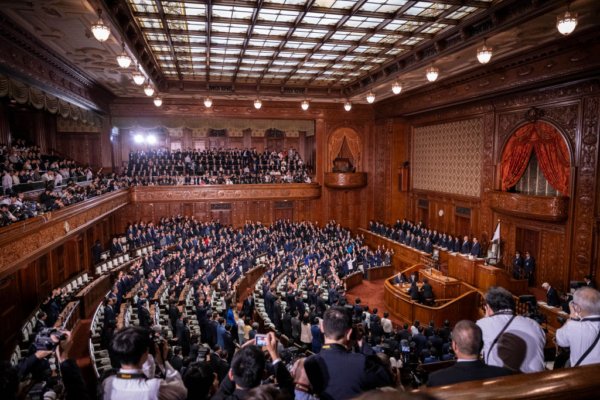The general election for the House of Representatives in Japan is set to take place on the 27th of this month. Several Japanese media outlets’ polls indicate that the ruling party in Japan, the Liberal Democratic Party (LDP), which has been plagued by political funding scandals, may lose some seats, leading to the possibility of not securing an outright majority in the House of Representatives.
According to the Nikkei Shimbun on Thursday, October 17th, the latest poll results suggest that the LDP may struggle to obtain 233 seats, which is the majority out of the total 465 seats in the House of Representatives in this election.
The newspaper, in collaboration with the Yomiuri Shimbun, conducted a nationwide joint survey on Tuesday and Wednesday, contacting 165,820 individuals randomly via phone and collecting their responses.
Since returning to power after three years in opposition in 2012, the LDP has maintained control of the House of Representatives on its own. Losing the majority would mean that the party might have to rely on coalition partners to continue governing.
According to Reuters, the LDP has already relied on the Komeito party to ensure a majority in the House of Councillors. Extending this dependency to the more powerful House of Representatives could give this governing partner backed by a religious group a greater say in decision-making.
Michael Cucek, a political science professor at Temple University in Tokyo, told Reuters, “I expect the LDP to secure the necessary majority seats together with its governing ally, Komeito.”
He added that if the LDP relies on Komeito to secure the majority, then Komeito would gain more influence, as in the past, Komeito has resisted some of the LDP’s more hardline security policies.
Compared to the LDP, Komeito is less inclined to accept policies, such as providing Japan’s Self-Defense Forces with longer-range missiles and lifting restrictions on weapons exports. These limitations on arms exports prevent Tokyo from supplying weapons to Ukraine or Southeast Asian countries opposing Beijing’s territorial ambitions in the South China Sea.
Before the dissolution of the House of Representatives, the ruling coalition held over 280 seats, with the LDP holding 258 seats and Komeito holding 32, well above the majority threshold. The largest opposition party, the Constitutional Democratic Party, had 98 seats. The third-largest party, the Innovation Party, retained 44 seats.
Media reports indicate that Nobuyuki Baba, the leader of the right-leaning Innovation Party, has not ruled out the possibility of cooperating with the LDP after the election. He supports enhancing Japan’s military capabilities and has expressed support for amending Japan’s pacifist constitution to formally recognize armed forces.
Over the past two days, Japan News Network (NNN) and the Yomiuri Shimbun conducted a poll on 263,027 interviewees via phone and online regarding the House of Representatives election.
The poll results suggest that the LDP may lose some seats, and it remains uncertain whether they can maintain the 233 seats required for a majority; Komeito may also not retain its current 32 seats and might even lose a few. However, the coalition of the two parties still has momentum to secure a majority.
At the same time, in the opposition camp, the largest opposition party, the Constitutional Democratic Party, shows promise with a potential increase from the pre-election 98 seats to over 130 seats.
The situation for the Japan Innovation Party is challenging, as they are expected to decrease from the pre-election 44 seats to around 30 seats.
A poll released by TBS Television on Wednesday, October 16th, indicates that the LDP may lose around 30 seats, while Komeito might lose a few seats.
On the same day, another poll with over 150,000 participants conducted by Kyodo News also shows that the LDP faces a tough challenge in securing a majority.
Last Wednesday, October 9th, Prime Minister Shigeru Ishiba announced the dissolution of the House of Representatives, with voting and ballot counting scheduled for the 27th of this month. The decision to dissolve the House of Representatives was made just eight days after Ishiba took office, setting the shortest record since World War II.
In December of last year, a political funding scandal erupted within the LDP, with several factions of the party exposed for political donation misreporting scandals, which severely impacted the previous administration under Prime Minister Fumio Kishida. Former Prime Minister Kishida announced in August of this year that he would not seek re-election, concluding his three-year term as prime minister.

